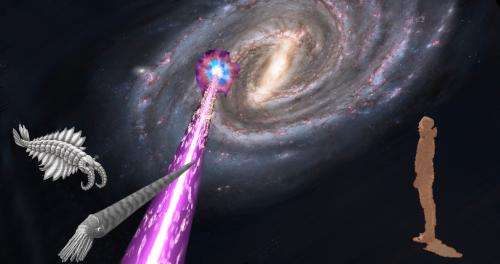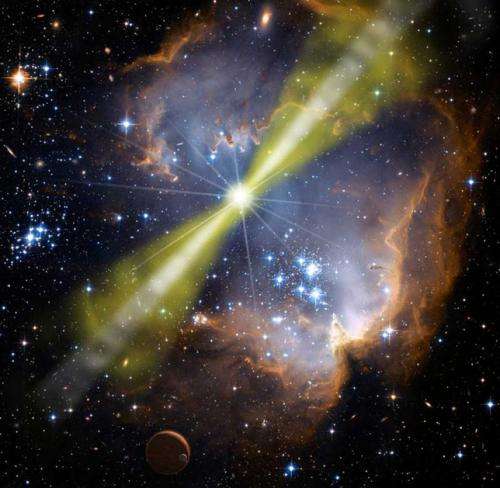Are gamma ray bursts dangerous?

If comics have taught me anything, it's that gamma powered superheroes and villains are some of the most formidable around.
Coincidentally, Gamma Ray bursts, astronomers say, are the most powerful explosions in the Universe. In a split second, a star with many times the mass of our Sun collapses into a black hole, and its outer layers are ejected away from the core. Twin beams blast out of the star. They're so bright we can see them for billions of light-years away. In a split second, a gamma ray burst can release more energy than the Sun will emit in its entire lifetime. It's a super-supernova.
You're thinking "Heck, if the gamma exposure worked for Banner, surely a super-supernova will make me even more powerful than the Hulk." That's not exactly how this plays out.
For any world caught within the death beam from a gamma ray burst, the effects are devastating. One side of the world is blasted with lethal levels of radiation. Our ozone layer would be depleted, or completely stripped away, and any life on that world would experience an extinction level event on the scale of the asteroid that wiped out the dinosaurs.
Astronomers believe that gamma ray bursts might explain some of the mass extinctions that happened on Earth. The most devastating was probably one that occurred 450 million years ago causing the Ordovician–Silurian extinction event. Creatures that lived near the surface of the ocean were hit much harder than deep sea animals, and this evidence matches what would happen from a powerful gamma ray burst event. Considering that, are we in danger from a gamma ray burst and why didn't we get at least one Tyrannosaurus Hulk out of the deal?
There's no question gamma ray bursts are terrifying. In fact, astronomers predict that the lethal destruction from a gamma ray burst would stretch for thousands of light years. So if a gamma ray burst went off within about 5000-8000 light years, we'd be in a world of trouble.
Astronomers figure that gamma ray bursts happen about once every few hundred thousand years in a galaxy the size of the Milky Way. And although they can be devastating, you actually need to be pretty close to be affected. It has been calculated that every 5 million years or so, a gamma ray burst goes off close enough to affect life on Earth. In other words, there have been around 1,000 events since the Earth formed 4.6 billion years ago. So the odds of a nearby gamma ray burst aren't zero, but they're low enough that you really don't have to worry about them. Unless you're planning on living about 5 million years in some kind of gamma powered superbody.
We might have evidence of a recent gamma ray burst that struck the Earth around the year 774. Tree rings from that year contain about 20 times the level of carbon-14 than normal. One theory is that a gamma ray burst from a star located within 13,000 light-years of Earth struck the planet 1,200 years ago, generating all that carbon-14.

Clearly humanity survived without incident, but it shows that even if you're halfway across the galaxy, a gamma ray burst can reach out and affect you. So don't worry. The chances of a gamma ray burst hitting Earth are minimal. In fact, astronomers have observed all the nearby gamma ray burst candidates, and none seem to be close enough or oriented to point their death beams at our planet. You'll need to worry about your exercise and diet after all.
So what do you think? What existential crisis makes you most concerned, and how do gamma ray bursts compare?
Source: Universe Today


















